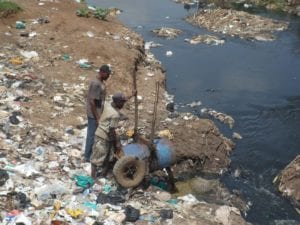Africa regional director of United Nations Environment, Julliette Biao Koudenoukpo has voiced her concern over the increase in toxic waste dumping in Africa.
Speaking on the side lines of the COP2 meeting to the Bamako convention in Abidjan-Ivory Coast earlier this year Koudenoukpo called on African countries that have ratified the Bamako Convention to work in synergy with the private sector to drive actions against toxic waste dumping in the continent.Strengthening cooperation
“There is a need to strengthen cooperation between the public and private sector, with a view to enhancing the effectiveness of the actions on ground,” she explained. The director also urged state actors to deepen cooperation with civil society organisations and business partners as part of a broader effort to raise the profile in the fight against toxic waste dumping, poverty and promoting green growth. Citing examples of toxic waste spills in Nigeria in 1988 and the Probo Koala scandal in Cote d’Ivoire in 2006 Koudenoukpo said that African nations have long been at the centre of incidents involving hazardous waste dumping and that it was time to bring this unfortunate situation to an end.







